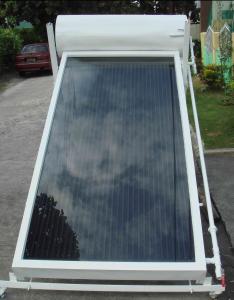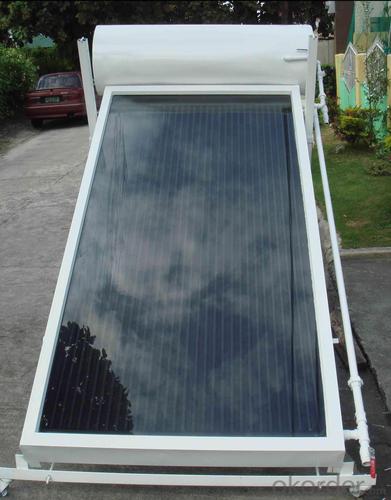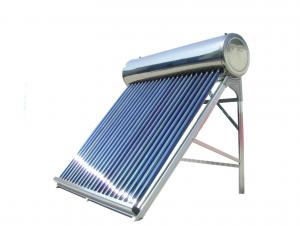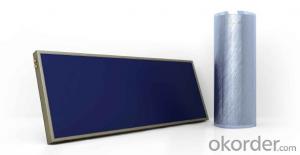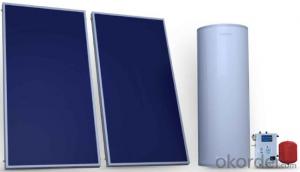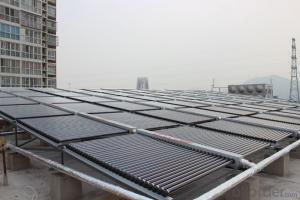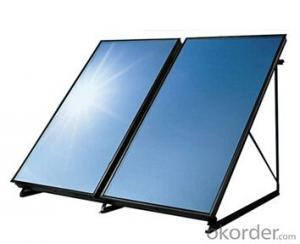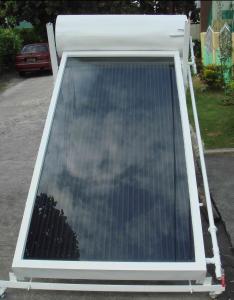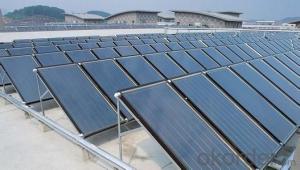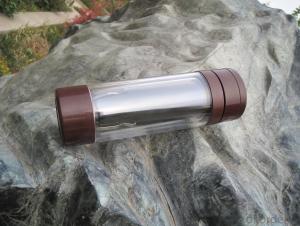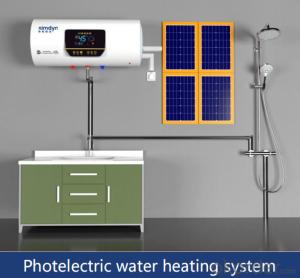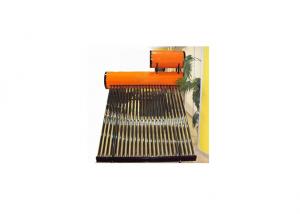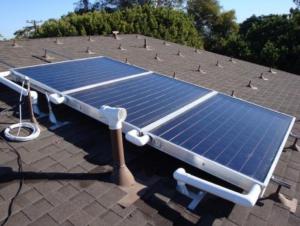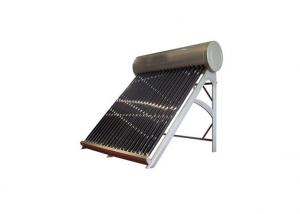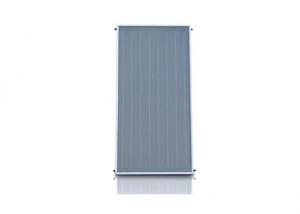GE Solar Water Heater FS-NPTS Series
- Loading Port:
- SHENZHEN Port
- Payment Terms:
- 100%TT
- Min Order Qty:
- 1000 UNITS unit
- Supply Capability:
- 1-10000 unit/month
OKorder Service Pledge
OKorder Financial Service
You Might Also Like
Details Of Solar Water Heater FS-NPTS Series
Specifications Of Solar Water Heater FS-NPTS Series
Model No.&Specs | FS-NPTS-200 | |
Solar collector | Absorber material | Black chrome coating,whole plate by laser welding |
Dimension LxWxT | 2000*1250*95mm | |
Overall area | 2.5m 2 X1pcs | |
Absorption | 95% | |
Emittance | ≤11% | |
Water Tank | Circulation Type | Non-pressurized open loop |
Tank capacity | 200L | |
External dimension | Ø525x1620mm | |
Outer tank material | Aluzinc Steel | |
Inner tank material | SUS304-2B | |
Max working pressure | 0Mpa | |
Eelctric booster | 1.5kw Thermowatt | |
Mounting rack | Material | Galvanized steel |
Bracket style | A: flat roof or B:Sloping roof | |
Connections&Controller | Circulation pipe material | Stainless steel corrugated pipe(Ø22mm) |
Compression fittings | Ø22mm*G3/4" | |
Controller | Automatically control the electric heater and minitor the water temperature | |
Overall weight | Weight of overall system(empty)(kg) | 135 |
Weight of overall system(filled)(kg) | 345 | |
Container loading | 20' | 27sets |
40' | 54sets | |
Advantage Of Solar Water Heater FS-NPTS Series
1.Stylish slimline design
2.Save 55% to 85% of your water heating energy consumption
3.Reliable, low maintenance operation
4.Hot water regardless of the weather
5.Can qualify for valuable government environmental incentives
6.Reduced energy use saves up to 3.2 tonnes of CO2 emissions every year
Usage/Application OfSolar Water Heater FS-NPTS Series
Integrated solar water heater
For independent courtyards such as villa, vacation village, rural housing and flat-roof buildings on the groundfloor.
Packaging & Delivery Of Solar Water Heater FS-NPTS Series | |
Packaging Detai | Packaging Detail:Export Carton and Pallet or under customer request. |
Delivery Detail:10-20days | |
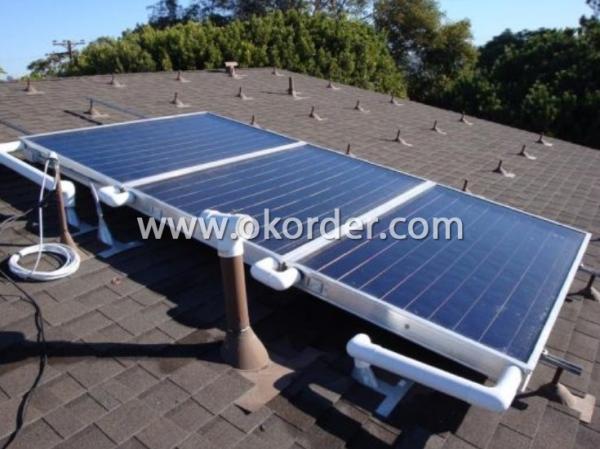
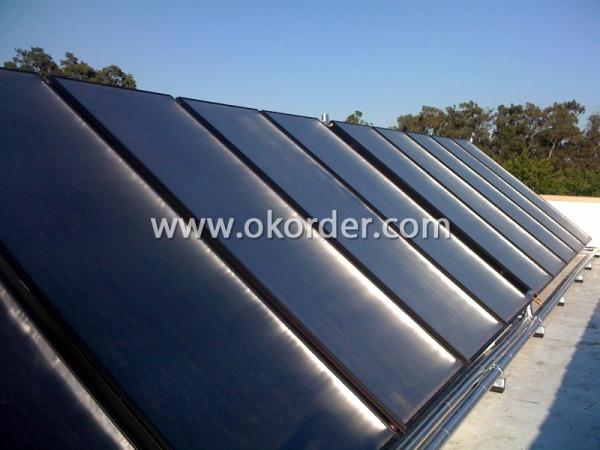
- Q: What is the average installation time for a solar water heater?
- The average installation time for a solar water heater typically ranges from one to three days, depending on factors such as the complexity of the system, the size of the property, and any existing plumbing or electrical work required.
- Q: Can a solar water heater be used in areas with limited access to sunlight for an extended period?
- No, a solar water heater cannot be effectively used in areas with limited access to sunlight for an extended period. The efficiency and performance of solar water heaters heavily depend on the availability of sunlight. In areas with limited sunlight, the system may not be able to generate enough heat to meet the desired water temperature and may not function optimally.
- Q: How does a solar water heater perform during winter months?
- During the winter months, the performance of a solar water heater may be reduced due to shorter days and lower solar radiation. However, most modern solar water heaters are designed to still operate efficiently during winter by utilizing insulation and backup heating systems, such as electric or gas, to ensure a continuous supply of hot water.
- Q: What is the average payback period for a solar water heater?
- The average payback period for a solar water heater typically ranges from 5 to 10 years, depending on factors such as the initial investment cost, energy savings, and local utility rates.
- Q: How does the payback period of a solar water heater compare to a traditional water heating system?
- The payback period of a solar water heater is typically shorter compared to a traditional water heating system. This is because the initial cost of installing a solar water heater may be higher, but the savings on energy bills over time can offset the upfront investment. Additionally, solar water heaters are more energy-efficient and environmentally friendly, leading to long-term cost savings and reduced carbon footprint.
- Q: How often does a solar water heater need to be serviced?
- A solar water heater typically needs to be serviced once every 1-2 years. Regular maintenance ensures optimal performance and longevity of the system. During the service, a professional technician will inspect and clean the solar collectors, check for any leaks or damage, test the pressure relief valve, and ensure all components are functioning correctly. Additionally, the anode rod inside the water tank may need to be replaced every 3-5 years to prevent corrosion. However, the frequency of servicing may vary depending on factors such as the quality of installation, water quality, and climate conditions. It is always recommended to consult the manufacturer's guidelines or seek advice from a professional for specific maintenance requirements for your solar water heater.
- Q: Can a solar water heater be used in areas with high levels of air pollution from factories?
- Yes, a solar water heater can still be used in areas with high levels of air pollution from factories. The efficiency of the solar water heater may be slightly affected due to reduced sunlight reaching the panels, as the air pollution can block and scatter sunlight. However, the system will still be able to generate hot water using the available solar energy, although it may require periodic cleaning or maintenance of the solar panels to ensure optimal performance.
- Q: Can a solar water heater be used in areas with high levels of air pollution from industrial emissions?
- Yes, a solar water heater can still be used in areas with high levels of air pollution from industrial emissions. The effectiveness of the solar water heater may be slightly reduced due to reduced sunlight reaching the solar panels, but it can still function and provide hot water. Regular cleaning and maintenance of the solar panels may be required to remove any accumulated pollutants and ensure optimal performance.
- Q: How does the location of the solar water heater affect its performance?
- The location of a solar water heater can significantly affect its performance. Ideally, the heater should be installed in an area with ample sunlight exposure throughout the day. If the location is shaded or receives limited sunlight, the efficiency of the solar panels will be reduced, resulting in decreased heating capacity. Additionally, the orientation and tilt of the panels should be optimized to maximize solar radiation absorption. The location should also consider factors such as wind, temperature, and potential obstructions to ensure optimal performance and efficiency of the solar water heater.
- Q: Solar water heater without the sun how to do?
- Solar water heaters do not have to worry about the sun:1, there is no sun weather, the water in the water heater is not heated, naturally not hot, but, if one day the water has not run out, it depends on the function of water tank insulation, good insulation, high temperature. On the other side. Such as Zhejiang in the winter is very cold, but the sun, three or four hours after the sun, the water temperature is also fifty or sixty degrees, is to rely on the preservation of the water tank.
1. Manufacturer Overview
| Location | Guangdong,China |
| Year Established | 1990 |
| Annual Output Value | Below US$1 Million |
| Main Markets | WORLDWIDE |
| Company Certifications |
2. Manufacturer Certificates
| a) Certification Name | |
| Range | |
| Reference | |
| Validity Period |
3. Manufacturer Capability
| a) Trade Capacity | |
| Nearest Port | GUANGDONG,SHENZHEN |
| Export Percentage | 61% - 70% |
| No.of Employees in Trade Department | more than 200 |
| Language Spoken: | English, Chinese |
| b) Factory Information | |
| Factory Size: | 500 square kilometre |
| No. of Production Lines | 2 |
| Contract Manufacturing | |
| Product Price Range | |
Send your message to us
GE Solar Water Heater FS-NPTS Series
- Loading Port:
- SHENZHEN Port
- Payment Terms:
- 100%TT
- Min Order Qty:
- 1000 UNITS unit
- Supply Capability:
- 1-10000 unit/month
OKorder Service Pledge
OKorder Financial Service
Similar products
Hot products
Hot Searches
Related keywords
